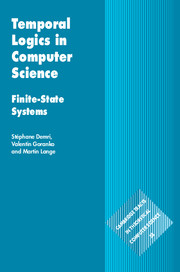1 - Introduction
Published online by Cambridge University Press: 13 October 2016
Summary
Temporal logics provide a generic logical framework for modelling and reasoning about time and temporal aspects of the world. While stemming from philosophical considerations and discussions, temporal logics have become over the past 50 years very useful and important in computer science, and particularly for formal specification, verification and synthesis of computerised systems of various nature: sequential, concurrent, reactive, discrete, real time, stochastic, etc. This book provides a comprehensive exposition of the most popular discrete-time temporal logics, used for reasoning about transition systems and computations in them.
Temporal Logics and Computer Science: A Brief Overview
We begin with a brief historical overview of temporal reasoning and logics and their role in computer science.
Historical Origins of Temporal Reasoning and Logics
The study of time and temporal reasoning goes back to the antiquity. For instance, some of Zeno's famous paradoxical arguments refer to the nature of time and the question of infinite divisibility of time intervals. Perhaps the earliest scientific reference on temporal reasoning, however, is Aristotle's ‘Sea Battle Tomorrow’ argument in the Organon II – On Interpretation, Chapter 9, claiming that future contingents, i.e. statements about possible future events which may or may not occur, such as ‘There will be a sea-battle tomorrow’, should not be ascribed definite truth values at the present time. A few decades later the philosopher Diodorus Cronus from the Megarian school illustrated the problem of future contingents in his famous Master Argument where he, inter alia, defined ‘possible’ as ‘what is or will ever be’ and ‘necessary’ as ‘what is and will always be’.
Philosophical discussions on temporality, truth, free will and determinism, and their relationships continued during the Middle ages. In particular, William of Ockham held that propositions about the contingent future cannot be known by humans as true or false because only God knows their truth value now. However, he argued that humans can still freely choose amongst different possible futures, thus suggesting the idea of a futurebranching model of time with many possible time-lines (histories), truth of propositions being relativised to a possible actual history. This model of time is now often called Ockhamist or actualist.
- Type
- Chapter
- Information
- Temporal Logics in Computer ScienceFinite-State Systems, pp. 1 - 14Publisher: Cambridge University PressPrint publication year: 2016



